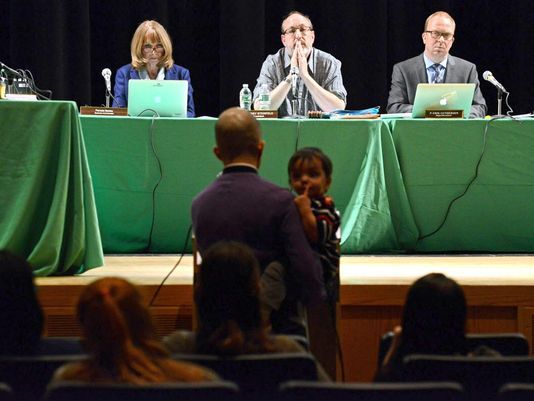This is a copy of a news article I appeared in on April 4, 2016. G (18 months old) and I are in the photo and appeared on the cover of The Record. Article by Andrew Wyrich. Photo by Amy Newman.
The Pascack Valley Regional High School District Board of Education voted Monday afternoon to reintroduce a policy that school officials say will protect the rights of transgender students, a proposal that had stoked strong emotions from people on both sides of the issue in recent weeks.
The policy would allow students to use restrooms and locker rooms based on their gender identity or to have increased privacy in some cases, among other provisions. While at least a dozen North Jersey districts have adopted similar policies over the past year with little public attention, the Pascack Valley proposal has come under scrutiny in recent weeks amid a larger national debate over accommodations for transgender people.
The Pascack Valley board had been prepared to take a final vote on the policy Feb. 22 but tabled it when some parents opposed it. Last week, when school officials held an informational meeting for parents, a conservative Christian group said in an email to the district that it might take legal action if the policy is adopted.
On Monday, the board introduced the policy again in a 7-1 vote with one abstention at Pascack Valley High School in Hillsdale. Afterward, a 2003 graduate of Pascack Valley High School, Hannah Simpson, held a forum attended by a small group of people to discuss her own experiences as a transgender person.
The board meeting, which began at 4 p.m., was attended by more than 50 people, including a large contingent of students who favored the policy. The district comprises two high schools, Pascack Valley and Pascack Hills, and serves students from Hillsdale, Montvale, River Vale and Woodcliff Lake. The board is expected to take a final vote on the proposal at next week’s meeting, scheduled for Monday night.
Two parents spoke against the policy in the public portion of the meeting. One woman said she was speaking for students who are afraid to come out against it. Another parent, Sam Girts, of Montvale, said that “this policy seems to disregard biology.”
Marc A. Stutzel, pastor of Christ Lutheran Church in Woodcliff Lake, voiced his support for the proposal. “God sees the dignity inside each person,” he said adding that the proposed policy “sees that dignity that all students have.”
A Pascack Hills student, Jonathan Levin of Woodcliff Lake, said the policy “achieves the goals of our innovative district. I can tell you as a student it would be foolish to vote against it. … We cannot afford to live in the past.”
Several transgender students also spoke, with one saying the policy would be “incredibly helpful and incredibly meaningful” and “validated” the transition of students who are transgender.
Jeffrey Steinfeld, the school board president, said the policy was “one of the most important” discussed in his 13 years as a board member. Aaron Potenza, director of programs at Garden State Equality, and Joshua Cohen, regional director of the Anti-Defamation League, both spoke in favor of the proposal.
Joseph Blundo, the only school board member to vote against introducing the policy, said he considered himself a liberal and a civil rights activist but was opposed to the policy’s provisions regarding bathrooms and locker rooms. “This is just about my belief that a 13- or 14-year-old should not be put in that position,” he said.
Board member Alfred Murphy, who abstained from voting, said he had “lost a lot of sleep” over the policy and was unsure how to vote because he did not “want to impose the law on the rest of the community” and did not want to oppose state law, which includes protections for people who are transgender.
Before the vote, Murphy said he was concerned about the privacy of students who might feel uncomfortable in a locker room or bathroom next to a transgender student. Superintendent P. Erik Gundersen responded that the school already has a policy in place where students who are uncomfortable in situations for any reason can be given alternative options.
“It’s a procedure we follow to this day, with or without a transgender policy in place,” Gundersen said.
Transgender policies similar to the one considered by Pascack Valley have been adopted this year by East Rutherford, North Arlington, Tenafly and Westwood. Bogota, Carlstadt, Clifton, Harrington Park, Mahwah, Pequannock, Upper Saddle River and Woodland Park previously adopted policies.
The Pascack Valley proposal appeared to be moving forward quietly until the Feb. 22 board meeting. Then, last week, the Liberty Counsel, a conservative Christian legal aid group that defended Kim Davis when she refused to issue same-sex marriage licenses in Kentucky last year, sent a letter to school board members threatening legal action if they voted to adopt the policy.
Some parents have expressed concerns about privacy issues for students who are not transgender and about a provision of the policy that would prohibit the schools from notifying them about a student’s gender identity without the student’s permission.
Simpson told the school board Monday that adopting the policy would be “empowering and protecting students” who may not have the support of their families.
“There have been students who stood on this very stage … who did not have that family support and are suffering the consequences of that, unfortunately,” Simpson said.
She later held a forum at the Hillsdale Ambulance Corps building where a small group listened to her discuss her struggles as a young person. When someone suggested that as society evolves, it won’t be an issue in 15 or 20 years, she responded, “That’s beautiful for the people 15 or 20 years from now.” She added that it’s important to put a policy in place to protect transgender children who are now in school, a protection she said she had not had.

